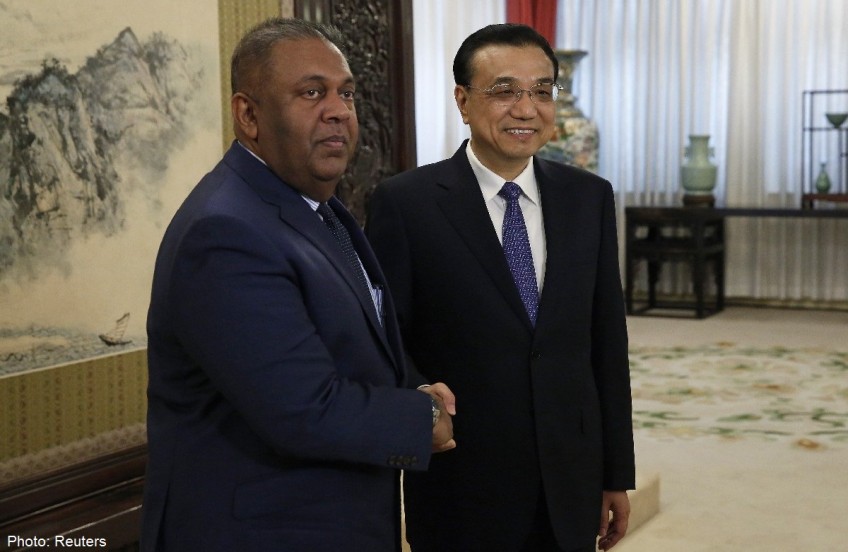Sri Lankan doubts on loans, submarines seen as rebuff to Beijing

BEIJING - If last week's visit to Beijing by Sri Lankan Foreign Minister Mangala Samaraweera was meant to allay fears that the island nation's new government was distancing itself from China, it failed.
If anything, Samaraweera's comments on the prospect of Chinese submarines using Sri Lanka as a stopover on long-distance westward missions and of bankrolling it through big loans underlined Colombo's hardening position, experts said.
That would be welcomed by India, which, as Sri Lanka's neighbour and traditional protector, had grown alarmed at its lurch towards China under the leadership of former president Mahinda Rajapaksa, ousted in a shock election defeat in January. "Some people say the (Sri Lankan) government had put too many eggs in the China basket," said Sinderpal Singh, an India expert at the National University of Singapore. "It's a symbol to say 'we would like to recalibrate our policy to one equidistant between India and China'." During his trip, Samaraweera said he did not envisage any more visits by Chinese submarines in the near future.
India voiced concern in November when Rajapaksa's government allowed a Chinese submarine and warship to dock in Colombo, seven weeks after another submarine called at the same port.
One of the submarine dockings coincided with a state visit by Japanese Prime Minister Shinzo Abe, himself wary of China's increasingly assertive projection of naval power. "...We will ensure that such incidents, from whatever quarters, do not happen during our tenure," Samaraweera said of the potential diplomatic embarrassment.
Samaraweera made the remarks to the press and did not discuss warships or submarines during talks with Chinese officials, according to a member of the Sri Lankan delegation.
And while his comments do not preclude the future use of Sri Lankan facilities by Chinese submarines, they pointed to greater caution both in economic and military relations.
"MANY QUESTIONS" ABOUT LOANS
Also in Beijing, Samaraweera said there were concerns about some of the US$5 billion (S$6.82 billion) in Chinese loans to Sri Lanka. "During the run up to the last presidential campaign, the people of Sri Lanka raised many, many questions about the interest rates especially, and also in certain cases about the manner in which these loans were raised," he said. "So we will, as a government committed to transparency, want to go into each of these matters." The country's finance minister will visit Beijing after President Maithripala Sirisena's state visit to China, slated for March 26-28, Samaraweera added.
In response to his comments, Chinese Foreign Ministry spokeswoman Hua Chunying told a daily news briefing that China's loans to Sri Lanka were made based on a consensus reached during talks and were provided at Sri Lanka's request.
China has invested heavily in Sri Lanka in recent years, funding airports, roads, railways and ports.
Sirisena unnerved China shortly after coming to power with a re-examination of some projects that it has invested in, including a US$1.5 billion "port city" in the capital Colombo.
India is worried about potential security threats posed by Chinese ownership of the freehold of 20 hectares of land next to the main commercial port in Colombo. India uses Colombo as a transhipment port.
Samaraweera addressed Beijing's concerns during his visit, saying that any decisions on affected projects would be made only after consulting China first.
"NORMAL ACTIVITIES"
Hua said Chinese naval vessels made port visits to Sri Lanka en route to duties off the coast of Somalia. "These are all normal, open and transparent activities made by relevant Chinese naval vessels," she told the briefing, adding that Sri Lanka had approved past visits in advance. "My understanding is that the Sri Lankan government's policies support international anti-piracy activities and welcome any friendly countries' naval vessels to dock at Sri Lanka's port," she said.
Some military experts questioned the assertion that the submarine visits were for anti-piracy operations. "The Chinese gave the excuse that the subs are required for piracy patrol, which nobody bought. So it was a sort of pressure tactic in the Indian Ocean," said retired Commodore Ranjit B. Rai, ex-director of India's naval intelligence and operations.
Despite signs of strain in relations, analysts believe any Sri Lankan moves would have only limited impact on China's push into the Indian Ocean.
Ni Lexiong, a naval expert at the Shanghai University of Political Science and Law, pointed out that China had strong ties with Pakistan and the Maldives. "This is reflective of major powers putting pressure on Sri Lanka behind the scenes, particularly the United States and India," he said. "The significance of this is mostly symbolic. There are other friendly countries where Chinese submarines can refuel."